
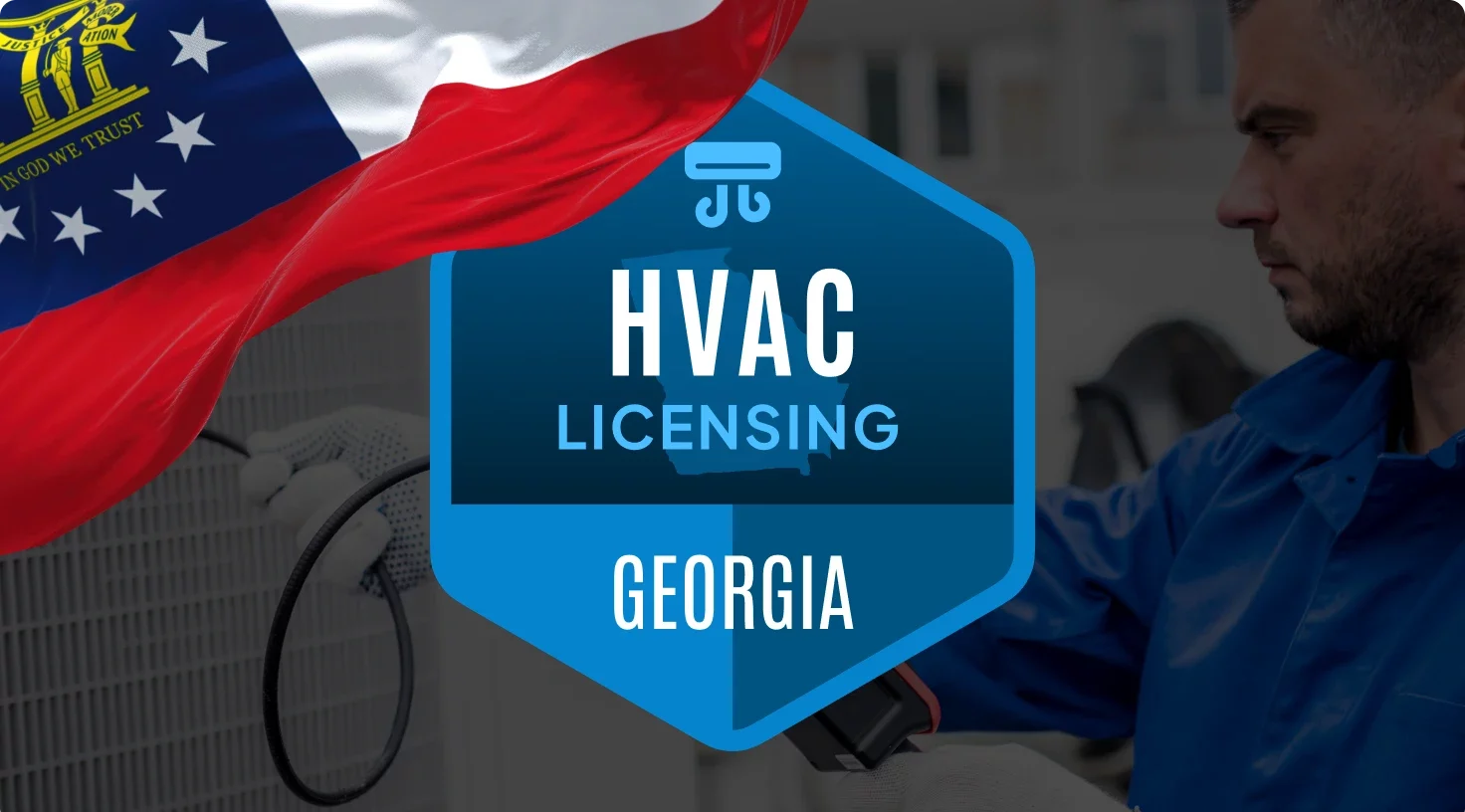
Are you aspiring to establish yourself as a skilled HVAC contractor in the dynamic state of Georgia? With sweltering summers that embrace heat and humidity, and winters that can bring forth chilly temperatures, the demand for proficient HVAC professionals is constant. This is particularly true in the vibrant Peach State, where the need for climate regulation is a year-round necessity. From the bustling streets of Atlanta to the serene landscapes of Savannah, the HVAC industry in Georgia offers a diverse range of opportunities.
In the following sections, we’ll touch on the layers of requirements, certifications, and preparations that pave the way to your success in Georgia’s HVAC industry. Whether you’re a newcomer to the field or an experienced professional seeking to enhance your career prospects, this guide is tailored to provide you with the information you need to embark on your journey toward HVAC contractor licensing in Georgia.
In Georgia, you do not need a license to work as an entry-level HVAC worker. However, if you want to work as a licensed HVAC contractor, you must obtain a Conditioned Air Contractor (CAC) license from the Georgia State Board of Conditioned Air Contractors. Engaging in HVAC projects without the appropriate license not only exposes you to potential legal repercussions but also compromises the quality and safety of the work performed.
But before you start the licensing process, it’s important to understand the different types of licenses available in Georgia and the scope of work they cover HVAC certifications.
To become an HVAC contractor in Georgia requires not only obtaining the appropriate license but also acquiring relevant certifications that showcase your expertise and commitment to excellence in the heating, ventilation, and air conditioning (HVAC) field. These certifications not only enhance your skills but also contribute to your credibility as a professional HVAC contractor. Here are some essential HVAC certifications you should consider:

Obtaining the EPA Universal Refrigerant Handling and Recovery Certification is a critical step for HVAC professionals in Georgia who work with refrigerants. This certification, mandated by the Environmental Protection Agency (EPA), is not only a legal requirement but also a testament to your expertise in handling refrigerants safely and responsibly.
The EPA Universal Refrigerant Handling and Recovery Certification, often referred to as EPA 608 certification, is designed to ensure that HVAC technicians have the knowledge and skills necessary to handle refrigerants in compliance with federal regulations. It encompasses different types of certifications based on the types of equipment and systems you work with. This includes:
NATE certifications are widely recognized in the HVAC industry and validate your expertise in various areas, including air conditioning, heat pumps, gas heating, and more. Earning NATE certifications demonstrates your proficiency and knowledge to potential clients and employers.
Administered by a non-profit organization, NATE, this certification is recognized throughout the industry as a benchmark of technical knowledge and practical skills.
Types of NATE Certifications:
NATE offers a wide range of certifications tailored to different HVAC disciplines, including:
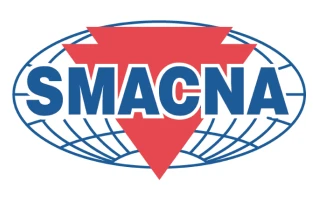
The Sheet Metal and Air Conditioning Contractors’ National Association (SMACNA) offers specialized certifications that cater to professionals working in the sheet metal and air conditioning industries. SMACNA is a renowned trade association that represents the interests of the sheet metal, heating, ventilation, and air conditioning (HVAC) industry.
These certifications validate your expertise and proficiency in specific aspects of HVAC systems, ensuring you meet the rigorous standards set by SMACNA.
SMACNA offers a range of certifications that cover various aspects of the HVAC industry, including:
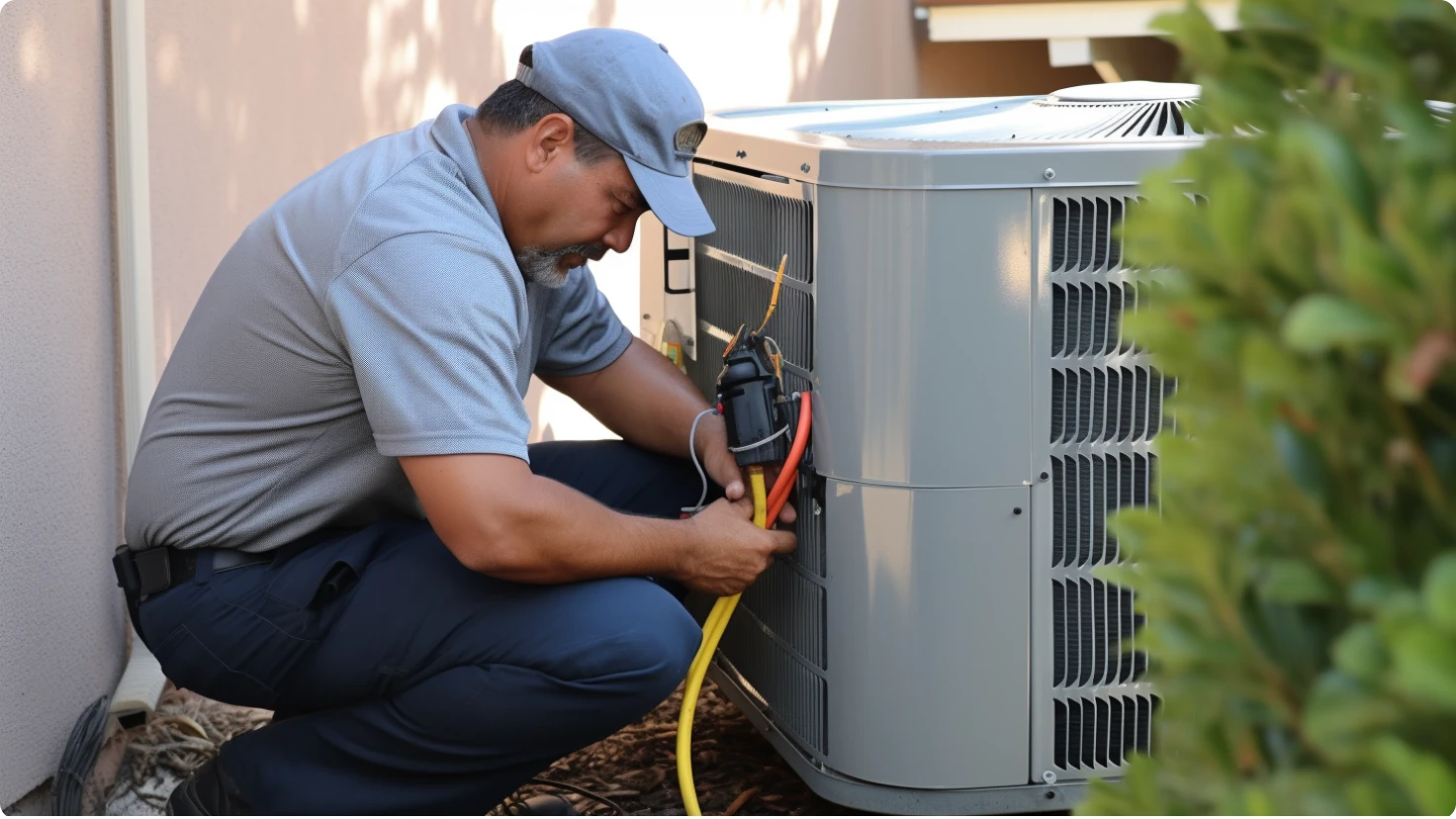
When pursuing a career as an HVAC professional in Georgia, it’s imperative to understand the intricacies of the two distinct types of HVAC licenses offered by the state. The GBCAC certification is issued by the Georgia State Board of Conditioned Air Contractors, a regulatory body that oversees HVAC contracting services within the state. This certification ensures that HVAC professionals meet specific qualifications and standards set by the board.
GBCAC offers two main types of HVAC licenses and these licenses determine the scope of work you’re authorized to undertake and play a significant role in shaping your HVAC career. Let’s explore each type of license in detail.
Scope and Limitations: The Class I HVAC license is a restricted license that is tailored for professionals working on HVAC systems with specific heating and cooling capacities. This license comes with certain limitations and is generally intended for smaller-scale HVAC systems.
Authorized Tasks:
Considerations: HVAC professionals who choose the Class I license should be mindful of the capacity limitations. While it may restrict you from working on larger systems, it is well-suited for residential and smaller commercial projects that fall within the specified capacity thresholds.
Scope and Flexibility: The Class II HVAC license offers unrestricted privileges and provides HVAC professionals with the flexibility to work on systems of any size. This license is designed for individuals who want to engage in HVAC projects without being limited by capacity constraints.
Authorized Tasks:
Considerations: HVAC professionals who opt for the Class II license enjoy a broader range of opportunities. This license is well-suited for those who intend to work on a diverse array of projects, from smaller residential systems to larger commercial and industrial installations.
Becoming a licensed HVAC professional in Georgia involves a series of steps that demonstrate your expertise and commitment to maintaining industry standards. Whether you’re an aspiring technician or aiming to establish your own HVAC contracting business, here is a step-by-step process to acquire the necessary license in Georgia.
As earlier stated, Georgia offers two primary types of HVAC licenses and the area of specialization you choose will determine the one you should apply for.
Remember that the Class I HVAC License is restricted and allows you to work on HVAC systems with a net heating capacity of up to 175,000 BTU and a net cooling capacity of up to 60,000 BTU. On the other hand, if you prefer to work on HVAC systems of any size, without capacity limitations, then you should consider the Class II HVAC License.
Ensure you meet the eligibility criteria set by the Georgia Board of Conditioned Air Contractors. These standards are very important and determine whether or not you will be able to proceed with the rest of the process.
Some of the basic requirements you must fulfill include:
In addition to these general requirements, some municipalities and counties in Georgia may have additional requirements. You should check with the Georgia State Board of Conditioned Air Contractors to find out the specific requirements.
Depending on the license type you’re pursuing, accumulate the necessary work experience:
Passing the Georgia Business and Law exam is essential. It tests your understanding of business practices and state regulations relevant to HVAC contractors. Study diligently to achieve a passing score.
Before applying for your license, secure liability insurance and a surety bond as required by Georgia regulations. These provide financial protection for your clients and your business.
Compile your application materials and submit them to the Georgia Board of Conditioned Air Contractors. Include documentation of your work experience, proof of passing the Georgia Business and Law exam, and evidence of insurance and bond.
Expect to undergo a background check and fingerprinting as part of the application process. This ensures your suitability for an HVAC contractor license.
Upon approval of your application and successful completion of all requirements, you’ll receive your HVAC license from the Georgia Board of Conditioned Air Contractors.
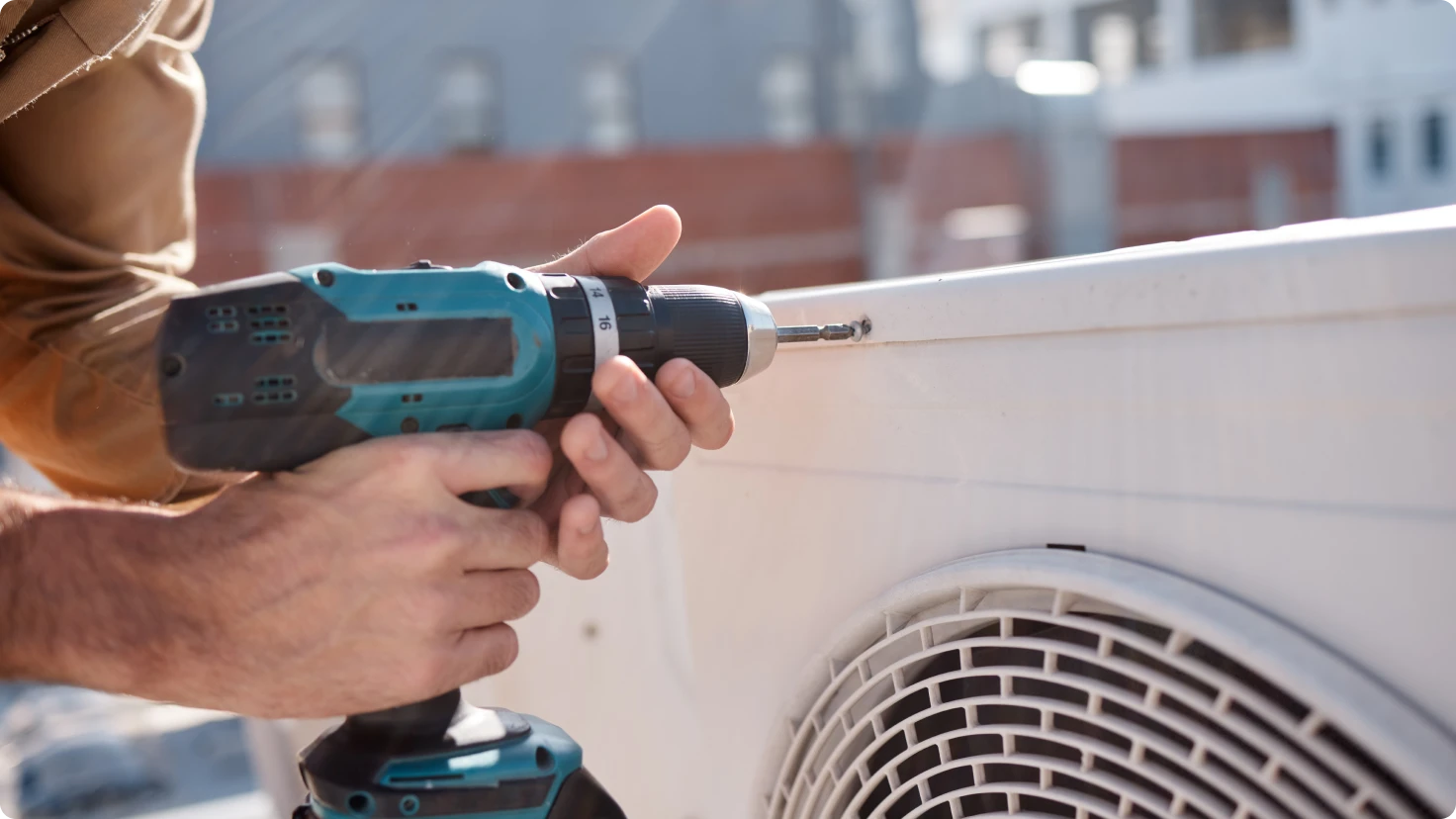
Here is a proper breakdown of the requirements you need to fulfill to become a licensed and certified HVAC technician in Georgia.
Here is a table summarizing the requirements for the two types of HVAC licenses in Georgia:
| License Type | Experience | Exam | Liability Insurance |
| Class I | 4 years | Yes | Yes |
| Class II | 5 years | Yes | Yes |
The CAC exam is a 100-question multiple-choice exam that covers the principles of heating, ventilation, and air conditioning, the installation, maintenance, and repair of HVAC systems, and the safety regulations for HVAC work. You must score at least 70% on the exam to pass.
The exam is administered by PSI (Proctored Services Inc.). You can find more information about the exam and how to register to take it on the PSI website.
You must have liability insurance in the amount of $10,000 for a Class I license and $15,000 for a Class II license. The insurance must cover bodily injury and property damage caused by your work as an HVAC contractor.
To apply for an HVAC license in Georgia, you must complete an application form and submit the following documents:
HVAC licenses in Georgia expire every two years. To renew your license, you must complete a renewal application and pay a renewal fee.
Obtaining a license brings numerous benefits that can elevate your expertise and advance your professional journey. Here are some key advantages of getting an HVAC license in Georgia:
An HVAC license is a badge of professionalism. It signifies your dedication to the HVAC field and your commitment to maintaining high standards. Being recognized as a licensed HVAC professional not only enhances your reputation but also garners respect from peers, clients, and employers.
An HVAC license expands your horizons in the industry. Licensed professionals have access to a wider array of job opportunities and are often considered more favorably for positions such as lead technicians, supervisors, or contractors. The license acts as evidence of your commitment to professionalism and expertise. One of the best opportunities is starting your own HVAC business and the best way to streamline and manage your business efficiently is with a field management software.
Licensed HVAC professionals generally command higher salaries than their unlicensed counterparts. Clients are willing to pay more for services provided by licensed individuals due to the assurance of quality work and adherence to industry standards. This translates to better earning potential for licensed technicians and contractors.
Clients are more likely to trust licensed HVAC professionals because licensure indicates a commitment to maintaining industry standards. Your license demonstrates that you’ve met stringent requirements and are dedicated to ensuring quality workmanship, ultimately fostering customer confidence and loyalty.
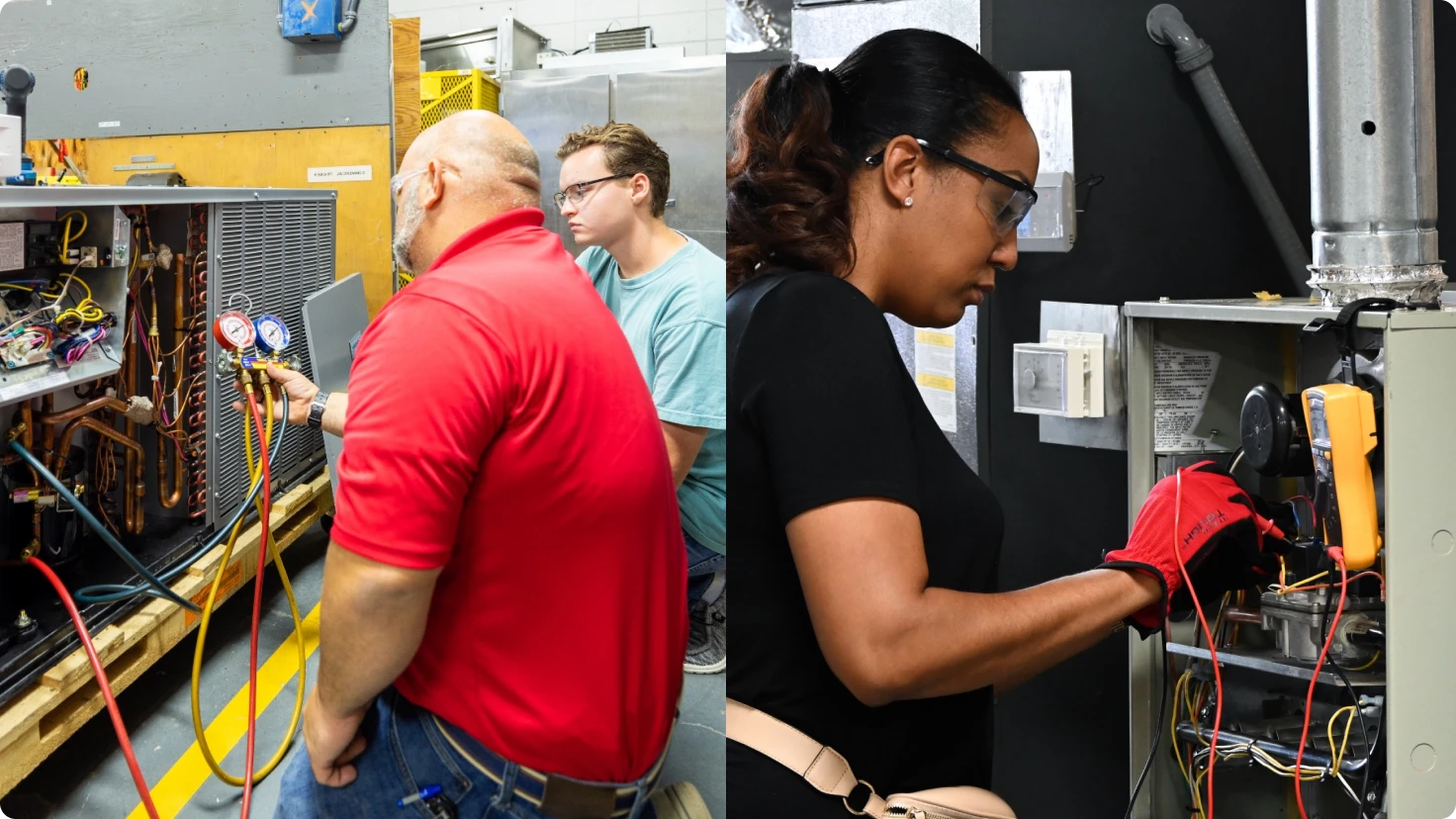
HVAC Students at Coastal Pines Technical College
You can undergo the following HVAC programs at Georgia:
Training Programs:
HVAC Schools:
For HVAC contractors, staying competitive and efficient in a rapidly evolving industry requires embracing modern technologies. HVAC software tools such as Workiz have emerged as indispensable assets, offering a wide range of benefits that can transform your contracting business. Here’s what HVAC contractors need to know about the significance of integrating HVAC software tools into their operations:
Here are some commonly asked questions about HVAC licensing in the city of Georgia
Yes, it is illegal to work as an HVAC contractor without a license in Georgia. If you are caught working without a license, you could be fined up to $1,000 per day. You could also be ordered to stop working and could be required to pay restitution to your customers.
Yes, certain educational programs, such as completion of a technical school’s engineering program, can be credited toward the required work experience. The extent of substitution varies based on the program complete
Discover how Workiz the #1 field service business management platform can help take your business to the next level with a quick demo!
By booking a demo, I agree to Workiz Terms of Service and Privacy Policy, and permit us to contact you, by SMS, at the phone number and email address you provide in this form.
Manage communications between techs and customers, review daily jobs, and handle administration wherever you are.
With the fully synchronized app and platform, your techs and dispatchers all get updated about new jobs and schedule changes in real time.
Streamline your processes and keep your teams organized so they get their jobs done faster and keep your customers happy.